
Russia has participated in the Eurovision Song Contest 23 times since its debut in 1994. Russia won the 2008 contest with Dima Bilan performing the song "Believe". One of the most successful countries in the contest in the 21st century with a total of ten top five placements, Russia finished second with Alsou in 2000, Dima Bilan in 2006, Buranovskiye Babushki in 2012 and Polina Gagarina in 2015; third with t.A.T.u. in 2003, Serebro in 2007, Sergey Lazarev in 2016 and 2019, and fifth with Dina Garipova in 2013. In 2018, the country failed to qualify for the final for the first time in its history. The Russian entry has been chosen through both internal selections and a televised national final titled Evrovidenie, with its most recent entry (2021) being chosen by the latter.

The Eurovision Young Musicians, often shortened to EYM, or Young Musicians, is a biennial classical music competition for European musicians that are aged between 12 and 21. It is organised by the European Broadcasting Union (EBU) and broadcast on television throughout Europe, with some countries holding national selections to choose their representatives for the contest.

The Eurovision Young Musicians 1994 was the seventh edition of the Eurovision Young Musicians, held at the Philharmonic Concert Hall in Warsaw, Poland, afterwards the last year's contest, winning country, Bartłomiej Nizioł performing the violin instrument, dated between the 9 and 14 June 1994. Organised by the European Broadcasting Union (EBU) and host broadcaster Telewizja Polska (TVP), musicians from eight countries participated in the televised final. A total of twenty-four countries took part in the competition therefore a semi-final was held in the same venue on 9 and 10 June 1994. Out of the 24 countries, 16 did not qualify to the final, including the host country Poland. All participants performed a classical piece of their choice accompanied by the Warsaw Symphony Orchestra, conducted by Kazimierz Kord.

The Eurovision Young Musicians 2010 was the fifteenth edition of the Eurovision Young Musicians, held at the Rathausplatz in Vienna, Austria on 14 May 2010. Organised by the European Broadcasting Union (EBU) and host broadcaster Österreichischer Rundfunk (ORF), musicians from seven countries participated in the televised final. This was the third time that the competition was held on an open-air stage and was the beginning of the annual Vienna Festival. Austria and broadcaster ORF previously hosted the contest in 1990, 1998, 2006 and 2008.

Austria has participated in the biennial classical music competition Eurovision Young Musicians 18 times since its debut in 1982 and is the most successful country in the contest, with a total of five wins. Austria has hosted the contest a record six times, in 1990, 1998, 2006, 2008, 2010 and 2012.

Germany has officially participated in the biennial classical music competition Eurovision Young Musicians 14 times since its debut in 1982, winning the inaugural contest that year. Before German reunification in 1990, it was presented as West Germany, representing the Federal Republic of Germany. East Germany did not compete. Germany won again in 1996 and have hosted the contest twice, in 2002 and 2014.

Norway has participated in the biennial classical music competition Eurovision Young Musicians 17 times since its debut in 1982, winning the contest for the first time in 2012. Norway did not officially take part in 1984, the only contest the country has missed as of 2022. It hosted the contest in 2000 and will do so again in 2024.

The Netherlands has participated in the biennial classical music competition Eurovision Young Musicians 12 times since its debut in 1984, winning the contest that year and in 1990. The Netherlands did not take part between 1992 and 1998, and again from 2016. The Netherlands hosted the contest in 1988.

Poland has participated in the Eurovision Young Musicians 14 times since its debut in 1992 and has won the contest three times to date. Poland hosted the contest in 1994.

Sweden has participated in the biennial classical music competition Eurovision Young Musicians 13 times since its debut in 1986, winning the contest for the first time in 2006. Sweden are yet to host the contest.

Slovenia has participated in the biennial classical music competition Eurovision Young Musicians 13 times since its debut in 1994, winning the contest for the first time in 2010.

Greece has participated in the biennial classical music competition Eurovision Young Musicians eleven times since its debut in 1990, winning the contest for the first time in 2008.

France has participated in the biennial classical music competition Eurovision Young Musicians ten times since its debut in 1982. France won the contest in 1986, and hosted the most recent event in 2022 in Montpellier.

Switzerland has participated in the biennial classical music competition Eurovision Young Musicians 13 times since its debut in 1982, most recently taking part in 2006. Switzerland have hosted the contest twice, in 1984 and 2004.

Portugal has participated in the biennial classical music competition Eurovision Young Musicians 4 times since its debut in 1990 and are yet to receive a top 3 placing in any contest. Portugal hosted the contest in 1996. Portugal previously attempted to take part in 1986, but were forced to withdraw as it had been unable to provide a "qualified candidate".

Spain has participated in the biennial classical music competition Eurovision Young Musicians eight times since its debut in 1988, most recently taking part in 2018, after a 16-year absence. The country's best result is a second-place finish in 1992, the only time in which they qualified for the televised final.

Belgium has participated in the biennial classical music competition Eurovision Young Musicians 11 times since its debut in 1986, most recently taking part in 2022. The country's best result is two second-place finishes, in 1990 and 1992; two of only three years in which the country has qualified for the televised final. Belgium hosted the contest in 1992.

Ukraine has participated twice in the Eurovision Young Musicians since its debut in 2008, most recently taking part in 2012. Ukraine was expected to return in 2020, however, the return did not occur.

Israel made their Eurovision Young Musicians debut at the Eurovision Young Musicians 1986, where they failed to qualify for the final.

The Eurovision Young Musicians 2018 was the nineteenth edition of the Eurovision Young Musicians contest. It was hosted by the United Kingdom, for the first time since the inaugural contest in 1982. This edition was a co-production between the European Broadcasting Union (EBU), the Edinburgh International Festival and the British Broadcasting Corporation (BBC) as host broadcaster. Musicians representing eighteen countries with EBU membership participated in the contest, with Albania making their debut alongside seven returning countries, while Austria decided not to participate for the first time.




















